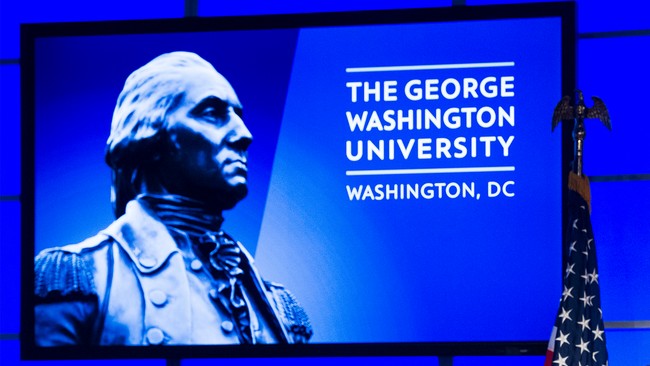
Early in the morning of April 27, Washington D.C. police were lined up outside the entrance to George Washington University waiting for the order to go in. The school administration, tired of the threats and intimidation by pro-Palestinian protesters, had asked the police to clear the tent encampment on the private property on which the school was located.
What happened next could only happen in the media-saturated capital of the United States.
The cops received an order to “stand down” and not enter the campus. According to the Washington Post, the mayor and chief of police were “worried about the optics of moving against a small number of peaceful protesters, according to two officials familiar with the talks.”
After that incident, the tent encampment grew. And the atmosphere around the protest became threatening. Students held a mock trial and sentenced the university president and several others to death.
Still, the cops did nothing despite pleas from the school administration.
Finally, as Mayor Muriel Bowser and Police Chief Pamela Smith were preparing to testify before the House Oversight Committee on Wednesday about their refusal to act to remove the protesters, the police paid a 3 a.m. call to the protest encampment and cleared it out.
BREAKING: Police finally cleared the camp at George Washington University early this morning.
Here they are pepper spraying some of the protestors: pic.twitter.com/BcRDo03zGL
— Steve McGuire (@sfmcguire79) May 8, 2024
“While the university is committed to protecting students’ rights to free expression, the encampment had evolved into an unlawful activity, with participants in direct violation of multiple university policies and city regulations,” the university said in a statement.
What changed? Why did the police move in now? There were no overt acts of violence and no obvious threats against students.
On Tuesday night, the demonstrators marched to university president Ellen M. Granberg’s house, an act that might have been construed as “threatening.” But the most logical assumption to be made about why the cops moved in now is that Bowser and Smith were about to get grilled by Republicans.
Members of Congress and university officials had been ratcheting up pressure on the city to move against the demonstrators since the encampment began.
On Monday, a House Democrat joined in the criticism of Bowser and Smith, casting the refusal by D.C. police to clear the encampment as a refusal to confront antisemitism.
“It is well past time for District officials to intervene and protect all students on campus,” Rep. Josh Gottheimer (D-N.J.) said in a letter being circulated among lawmakers for signatures.
The police called the move to end the protests a response to a “gradual escalation in the volatility of the situation.” In fact, it was so gradual that no one noticed until the mayor and police chief were called before Congress.
Senate Minority Leader Mitch McConnell (R-Ky.) issued a statement before the police acted at GWU that reminds us of one of the clear lessons of history.
“And as addled as any generation’s radical cries may be, the American people have usually been able to trust that eventually, the would-be Maoists would submit to the lessons of history.”
“But today, the guardrails against professional radicalism have grown vanishingly thin.”
“Unlike in the 1960s, today’s Red Guards actually have academic tenure.”
True dat.











